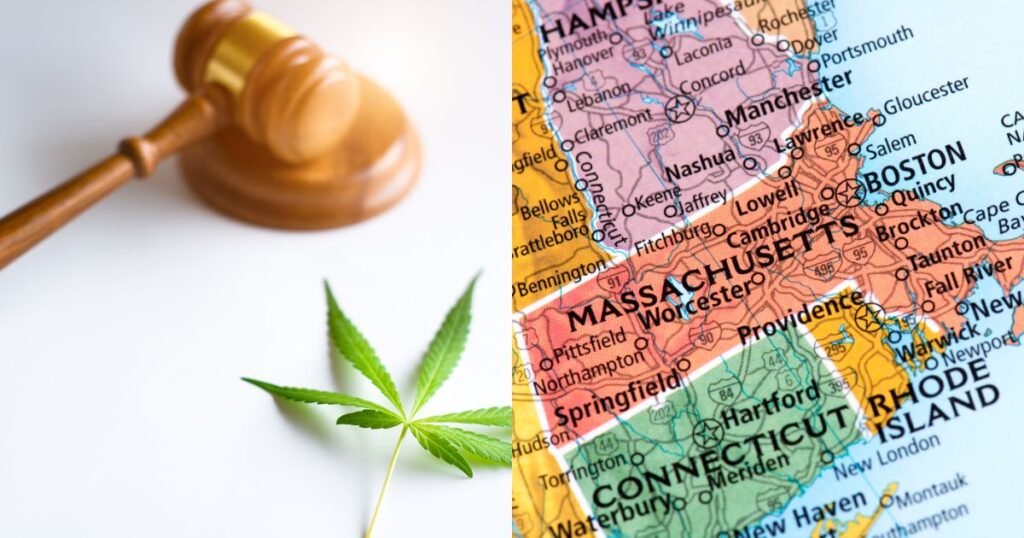A ballot initiative making its way through Massachusetts aims to effectively dismantle the state’s recreational cannabis industry. This significant change could greatly impact the Massachusetts cannabis market. Despite its misleading name, “An Act to Restore a Sensible Marijuana Policy,” the proposal would eliminate licensed dispensaries and ban home cultivation for adult use.
According to campaign spokesperson Wendy Wakeman via Cannabis Business Times, signature collection is “on track,” with organizers targeting over 100,000 signatures by their December deadline to account for the verification process.
The initiative needs nearly 75,000 valid signatures to qualify for the 2026 ballot. If passed, it would repeal the commercial cannabis market that Massachusetts voters approved in 2016, while maintaining decriminalization for possession of up to one ounce. Adults could still possess cannabis, but they’d have nowhere legal to buy it.
This creates an obvious problem: demand for cannabis won’t disappear just because dispensaries close. Instead, consumers would be pushed back toward unregulated sources where products aren’t tested for contaminants like pesticides, heavy metals, or dangerous additives. The “sensible” policy would actually restore the exact conditions voters rejected nearly a decade ago.
The Economic Fallout of Prohibition 2.0
Massachusetts has built one of the most robust cannabis markets in the country. Since legalization, the state has recorded more than $8 billion in adult-use marijuana sales. The industry supports approximately 27,000 direct employees, as well as countless indirect jobs in a wide range of supporting businesses that rely on the cannabis sector for their livelihoods.
The tax implications alone make this proposal economically reckless. Massachusetts collects a 10.75% cannabis excise tax, which generated over $15 million in 2025. That revenue funds substance abuse treatment programs, public education initiatives, and regulatory oversight.
Eliminating licensed dispensaries wouldn’t remove demand—it would simply shift cannabis back to an unregulated, irresponsible system. Licensed cannabis businesses don’t just employ budtenders and cultivators. They support restaurants and inns that workers patronize, commercial real estate that would sit vacant, and local tax bases that depend on cannabis revenue.
The prohibition advocates behind this initiative claim the illicit market is still thriving despite legalization, suggesting their policy would somehow address this. But cannabis industry experts point to high taxes, municipal opt-outs, and restrictive policies as the actual drivers of illicit market activity.
Eliminating the legal market entirely would create the ultimate restrictive policy, guaranteeing that every cannabis transaction flows through unregulated channels.
Product Safety and Public Health in the Massachusetts Cannabis Market
One of the most significant achievements of legalization has been establishing mandatory testing and tracking systems for cannabis products. Massachusetts operates one of the strictest regulatory frameworks in the country. Every product sold through licensed dispensaries must pass testing for potency, pesticides, heavy metals, microbials, and residual solvents.
These protections would vanish if consumers were forced back to illicit sources. Street dealers don’t submit products for laboratory testing. They don’t follow standardized growing practices. They have no accountability for what ends up in their products or who they sell to.
The health risks extend beyond contamination. Legal dispensaries provide accurate labeling, dosage information, and access to knowledgeable staff who can guide consumers toward appropriate products. They check IDs and maintain purchase limits. None of these safeguards exist in unregulated markets.
Massachusetts rolled out a highly regulated system precisely to ensure cannabis is lawfully grown and sold through a tested, tracked, and taxed framework. Dismantling this infrastructure doesn’t protect public health—it undermines it.
The Medical Marijuana Footnote
While the initiative would preserve Massachusetts’ medical marijuana program, that’s cold comfort for the 91% of cannabis consumers who use the adult-use market. In 2024, medical cannabis sales represented just 9% of the state’s overall licensed marketplace, totaling approximately $162 million compared to $1.6 billion in recreational sales.
Forcing recreational consumers to obtain medical cards creates unnecessary barriers. Not everyone wants to disclose cannabis use to their doctor or pay the fees associated with entering the medical program. Many recreational users consume cannabis occasionally or socially, making a medical card impractical.
This two-tiered approach also ignores the reality that medical and recreational consumers often purchase from the same dispensaries, supporting the same businesses and workers. Eliminating adult-use sales would devastate the industry infrastructure that medical programs depend on.
Who’s Really Behind This Initiative
The campaign is led by four Massachusetts Republican State Committee members: Caroline Cunningham, David Lunger, Kathleen Lynch, and Timothy Smyth.
Wakeman maintains that their petition focuses specifically on rolling back recreational dispensaries and home cultivation, distinguishing it from other proposals that would cap THC content. She claims voters were “sold” on the idea that legalization would eliminate the illicit market, and since that hasn’t fully happened, prohibition should return.
This argument ignores that no policy completely eliminates illicit markets. Alcohol prohibition didn’t end drinking—it created organized crime. Tobacco taxes haven’t eliminated cigarette smuggling. The goal of legalization was never to instantly eradicate every illegal transaction, but to create a legal alternative that would gradually reduce illicit market share while generating tax revenue and ensuring product safety.
Massachusetts’ legal market has succeeded by those metrics. The state has collected billions in tax revenue, created tens of thousands of jobs, and established rigorous safety standards. The continued existence of some illicit market activity reflects policy shortcomings that could be addressed through lower taxes, expanded licensing, and reduced municipal opt-outs—not by burning down the entire legal framework.
Pattern of Prohibitionist Rhetoric
The initiative’s name itself reveals the disconnect between its stated goals and actual effects. Calling a proposal to eliminate legal cannabis sales “sensible marijuana policy” is prohibitionist doublespeak.
There’s nothing sensible about pushing consumers toward unregulated products, eliminating thousands of jobs, and throwing away hundreds of millions in tax revenue.
This rhetoric pattern isn’t unique to Massachusetts. Across the country, cannabis opponents frame their proposals in terms of protecting children, public health, or community values while ignoring the substantial evidence that legal, regulated markets serve these goals better than prohibition ever did.
The “restore” framing is particularly telling. Restore what, exactly? The pre-legalization era when people were arrested for possession? When cannabis revenue flowed entirely to illicit dealers? When products were completely untested and unregulated? That’s the system Massachusetts voters explicitly rejected in 2016.
What Happens Next for Massachusetts Cannabis Market?
The campaign has until December 3 to submit their signatures. If they collect enough valid signatures, the question would appear on the 2026 ballot. Massachusetts voters would then decide whether to reverse course on a policy they approved by a comfortable margin less than a decade ago.
The cannabis industry needs to stay vigilant, which means educating the public about what’s actually at stake.
The head of Massachusetts’ Cannabis Control Commission has already warned that the measure could imperil tax revenue currently supporting substance misuse treatment and other public programs.
That’s a devastating irony—eliminating legal cannabis would reduce funding for the very programs prohibitionists claim to care about.
A Choice Between Regulation and Prohibition in Massachusetts Cannabis Market
This ballot initiative presents a clear choice. Massachusetts can maintain its regulated cannabis market with mandatory testing, licensed operators, substantial tax revenue, and tens of thousands of jobs.
Or it can return to a system where cannabis flows entirely through unregulated channels, with zero quality control, zero tax revenue, and zero accountability.
The prohibition advocates may sincerely believe they’re pursuing sensible policy. But their proposal would achieve the opposite of its stated goals. It wouldn’t reduce cannabis use or protect public health.
It would eliminate the legal protections that currently exist while guaranteeing that every cannabis purchase supports unregulated dealers instead of licensed businesses and state coffers.
Cannabis legalization wasn’t perfect from day one. No major policy shift ever is. But the solution to implementation challenges isn’t to abandon the entire framework and return to a failed prohibition model that voters already rejected.
Massachusetts has spent years building a regulated cannabis market that serves consumers, generates revenue, creates jobs, and maintains product safety standards. Throwing that away would be the opposite of sensible marijuana policy.
- Cannabis Study Shows a Reduction in Use of Unregulated Opioids
- Massachusetts Ballot Proposals Aim To Roll Back Recreational Cannabis Legalization
- New Approach To Consumption Lounges In Massachusetts
- Massachusetts Cannabis Industry Sets Record with $1.64 Billion in Sales for 2024
- 50+ Organizations Back MORE Act in Letter to U.S. House of Representatives























